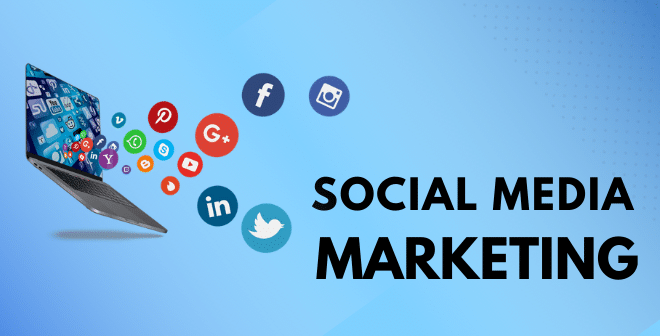Social media marketing involves the promotion of a business or product with the help of social media platforms. This can be done by creating and sharing content, engaging with followers, and running advertising campaigns. Social media has evolved into an effective tool for businesses to engage with customers and raise brand recognition. With millions of users worldwide, social media offers a vast audience that businesses can tap into.
I. Why is Social Media Marketing Important?
Social media marketing is important for several reasons. Firstly, it enables firms to contact a big number of people swiftly and easily. Second, it is a low-cost method of promoting goods and services. Lastly, social media may assist firms in increasing brand awareness and communicating with customers in a more personalized manner. Finally, social media can drive traffic to a company's website and increase sales.
II. Steps to Start a Social Media Marketing Strategy
2. Set Goals and Objectives - Establishing clear goals and objectives for your social media marketing strategy will help you measure its success. For example, you may want to increase brand awareness, drive website traffic, or generate leads.
3. Choose Social Media Platforms -Not all social media networks are the same. Choose the ones that are most important for your company and audience.
4. Develop a Content Strategy - To guarantee that your social media material is interesting, educational, and connected with your company objectives, create a content plan.
III. Advantages Of Social Media Marketing
1. Increased Brand Awareness: Social media platforms give businesses the chance to connect with a sizable audience and raise brand recognition. By consistently sharing engaging content and interacting with followers, businesses can build a loyal fan base and expand their reach.
2. Cost-effective: One of the biggest advantages of social media marketing is that it is cost-effective. Unlike traditional advertising methods, social media platforms allow businesses to reach a large audience at a fraction of the cost. This means that even small businesses with limited budgets can still compete with larger brands.
3. Increased Customer Engagement: Social media platforms allow businesses to engage with their customers on a personal level. By responding to comments and messages, businesses can build strong relationships with their customers and create a loyal fan base.
4. Targeted Advertising: Social media platforms offer businesses the ability to target their advertising to specific demographics. This means that businesses can create highly targeted campaigns that are more likely to reach their desired audience.
5. Increased Website Traffic: Social media marketing can also drive traffic to a company's website. By including links to their website in their social media content, businesses can direct followers to their site, increasing their chances of making a sale.
Ultimately, social media marketing is a strong tool that may assist businesses in connecting with their target audience, increasing brand recognition, and driving sales. With the power of social media, businesses may take their marketing efforts to the next level and achieve new levels of success.
IV. Best Social media platforms for marketing
2. Instagram: Instagram is a visually appealing platform that is ideal for companies who want to highlight their goods or services. With over 1 billion monthly active users, Instagram offers a range of tools for businesses, including shoppable posts, paid advertising, and influencer marketing.
3. Twitter: Businesses who wish to interact with their audience in real-time should use the Twitter platform. Companies that want to update their audience on their latest news and events could use Twitter, which has over 330 million active users each month.
4. LinkedIn: LinkedIn is a professional networking platform that is perfect for B2B businesses. With over 740 million members, LinkedIn offers a range of tools for businesses, including paid advertising, company pages, and job listings.
5. YouTube: Businesses who wish to produce video content should use the video-sharing site YouTube. With more than 2 billion monthly active users, YouTube is ideal for companies looking to visually engage customers with their goods or services.
The ideal social media channels for marketing will ultimately depend on your company's objectives and target market. You may select the platforms that are suitable for your company and accomplish your marketing objectives by being aware of the distinctive characteristics and advantages of each one.
V. Social media marketing trends
1. Video Content: Video content is becoming increasingly popular on social media platforms. Businesses are using video content to showcase their products or services, provide how-to guides, and share behind-the-scenes footage. Videos are more engaging than text or images, and they are more likely to be shared.
2. Influencer Marketing: Influencer marketing involves partnering with social media influencers to promote your products or services. Influencers have large followings on social media, and their followers trust their opinions and recommendations. By partnering with influencers, businesses can reach new audiences and increase brand awareness.
3. Stories: Stories are short, vertical videos or images that disappear after 24 hours. They are becoming increasingly popular on social media platforms, and businesses are using them to share behind-the-scenes footage, promote special offers, and showcase their products or services. Stories are a great way to engage with your audience and create a sense of urgency.
4. Personalization: Personalization involves tailoring your marketing messages to individual customers based on their preferences and behaviors. Social media platforms offer a range of tools that allow businesses to personalize their marketing messages, including targeted advertising and dynamic product ads.
5. Social Commerce: Social commerce involves selling products or services directly on social media platforms. With the rise of shoppable posts and social commerce features, businesses can now sell products or services without customers ever leaving the social media platform.
Businesses can use social media to create engaging content, reach new audiences, and drive sales.
VI. Social media marketing metrics
1. Engagement: Engagement measures how much your audience is interacting with your social media content. This includes likes, comments, shares, and clicks. High levels of engagement indicate that your content is resonating with your audience and driving engagement.
2. Reach: Reach measures how many people have seen your social media content. It's important to track your reach to ensure that your content is reaching a broad audience and increasing brand awareness.
3. Conversions: Conversions measure how many people have taken a desired action after seeing your social media content. This could be anything from making a purchase to filling out a lead form. Tracking conversions is essential for understanding the ROI of your social media marketing efforts.
4. Impressions: Impressions measure how many times your social media content has been seen. It's important to track impressions to ensure that your content is being seen by your target audience.
5. Click-through Rate (CTR): CTR measures the percentage of people who clicked on a link in your social media content. High CTRs indicate that your content is compelling and driving traffic to your website or landing page.
By tracking these social media marketing metrics, businesses can gain valuable insights into the effectiveness of their social media marketing efforts. These insights can be used to make data-driven decisions, optimize your social media strategy, and drive even greater success.
VII. Social media targeting
1. Demographics: Demographic targeting allows businesses to target their social media content to specific age groups, genders, locations, and other demographic factors. This can help businesses reach their ideal audience and tailor their marketing messages to their target demographic.
2. Interests: Interest targeting allows businesses to target their social media content to people who have expressed interest in specific topics, hobbies, or activities. This can help businesses reach a highly engaged audience that is more likely to be interested in their products or services.
3. Behaviors: Behavioral targeting allows businesses to target their social media content to people who have exhibited certain behaviors, such as making a purchase or visiting a website. This can help businesses reach a highly qualified audience that is more likely to convert.
4. Lookalike Audiences: Lookalike audience targeting allows businesses to target their social media content to people who are similar to their existing customers. By targeting lookalike audiences, businesses can expand their reach and increase the effectiveness of their social media marketing efforts.
5. Custom Audiences: Custom audience targeting allows businesses to target their social media content to people who have interacted with their brand in some way, such as visiting their website or subscribing to their email list. By targeting custom audiences, businesses can create highly personalized marketing messages that are more likely to resonate with their audience.
By leveraging the power of social media targeting, businesses can reach their ideal audience with precision and accuracy. This can help businesses increase brand awareness, drive traffic to their website, and boost conversions. By tailoring their marketing messages to their target audience, businesses can achieve even greater success with their social media marketing efforts.
VIII. Social media advertising
Social media advertising is a powerful way for businesses to reach their target audience and drive results. Here are some of the key benefits of social media advertising:
1. Increased Reach: Social media advertising allows businesses to reach a much broader audience than organic social media posts. By targeting specific audiences and creating compelling ad content, businesses can reach more people and increase brand awareness.
2. Targeted Advertising: With social media advertising, businesses can target their ads to specific audiences based on factors such as demographics, interests, and behaviors. This allows businesses to reach the right people with the right message, increasing the effectiveness of their advertising campaigns.
3. Cost-Effective: Social media advertising is often more cost-effective than traditional advertising channels. With options such as cost-per-click (CPC) and cost-per-impression (CPM) bidding, businesses can control their advertising spend and ensure that they are getting the most bang for their buck.
4. Measurable Results: Social media advertising provides businesses with detailed analytics and metrics, allowing them to track the success of their advertising campaigns and make data-driven decisions.
5. Customizable Ad Formats: Social media advertising offers a range of ad formats, including image ads, video ads, carousel ads, and more. This allows businesses to create customized ad content that is tailored to their target audience and their specific marketing objectives.
By leveraging the power of social media advertising, businesses can increase their reach, target their ideal audience, and drive measurable results. With the ability to control their advertising spend and customize their ad formats, businesses can achieve even greater success with their social media marketing efforts.
IX. Social media influencers
1. Increased Reach: Social media influencers have large followings on their respective social media platforms, which means that they have the ability to reach a much broader audience than businesses can on their own. By partnering with influencers, businesses can tap into their existing audience and expand their reach.
2. Authenticity and Trust: Social media influencers have built up a loyal following of people who trust their opinions and recommendations. By partnering with influencers, businesses can leverage this trust and authenticity to promote their products or services.
3. Targeted Marketing: Influencers often have a specific niche or area of expertise, which means that businesses can work with influencers who are aligned with their target audience. This allows businesses to create highly targeted marketing campaigns that are more likely to resonate with their ideal customers.
4. Cost-Effective: Working with social media influencers can be more cost-effective than traditional advertising channels. Influencers may be willing to work for a lower fee or in exchange for free products or services, which can be a cost-effective way for businesses to reach a highly engaged audience.
5. Creative Content: Social media influencers are often highly skilled at creating compelling and engaging content. By partnering with influencers, businesses can tap into their creativity and create unique and interesting content that stands out on social media.
By working with social media influencers, businesses can tap into their existing audience, increase brand awareness, and drive conversions. With the ability to create highly targeted marketing campaigns and leverage the authenticity and trust of influencers, businesses can achieve even greater success with their social media marketing efforts.
X. Social Media Marketing Mistakes
1. Failing to define a clear strategy: Without a clear strategy in place, your social media marketing efforts can become aimless and unfocused. Define your goals, target audience, and tactics before launching any campaigns.
2. Ignoring your audience: Social media is all about engagement and building relationships with your audience. Negative images of your brand may arise if you ignore feedback or communications or don't reply in a timely manner.
3. Inconsistency: Posting inconsistently can lead to a lack of engagement and growth. Set a consistent posting schedule and stick to it.
4. Overpromoting: Constantly promoting your products or services without providing value to your audience can be a major turn-off. Share valuable content and engage with your audience to build trust and credibility.
5. Neglecting analytics: Measuring your success is crucial to improving your social media marketing efforts. Neglecting analytics can lead to missed opportunities and wasted resources.
6. Failing to adapt to changes: Social media platforms and trends are constantly evolving. Failing to adapt to changes can lead to missed opportunities and a decrease in engagement.
7. Not understanding your audience: Understanding your audience's preferences and needs is key to creating effective social media campaigns. Conduct market research and use analytics to gain insights into your audience.
By avoiding these frequent social media marketing blunders, you may strengthen your company's brand presence and establish a closer connection with your audience.
XI. Social media management tools
1. Time-Saving: Social media management tools can automate many tasks, such as scheduling posts and monitoring social media activity. This can save businesses a significant amount of time and allow them to focus on other important tasks.
2. Improved Organization: Social media management tools can help businesses stay organized by providing a centralized platform for managing all their social media accounts. This can help prevent errors and ensure that all social media activity is cohesive and aligned with the business's overall marketing strategy.
3. Analytics and Reporting: Social media management tools often provide detailed analytics and reporting, which can help businesses track the success of their social media marketing efforts and make data-driven decisions.
4. Collaboration: Many social media management tools offer collaboration features, allowing multiple team members to work together on social media tasks. This can improve efficiency and help ensure that all social media activity is consistent and aligned with the business's overall goals.
5. Customizable Dashboards: Social media management tools often offer customizable dashboards, allowing businesses to track the metrics that matter most to them. This can help businesses focus on their key performance indicators (KPIs) and make informed decisions to improve their social media marketing strategy.
By using social media management tools, businesses can save time, improve organization, and gain valuable insights into their social media marketing efforts. With the ability to collaborate and customize their dashboards, businesses can improve efficiency and achieve even greater success with their social media marketing efforts.
We appreciate you reading our social media marketing blog post. For businesses wishing to be successful on social media, staying current with trends and techniques is essential. Businesses may enhance their social media marketing efforts and have more success by putting the advice and tactics in this piece to use. Never forget that the purpose of social media marketing is to interact with your audience and develop enduring relationships. We wish you success in your efforts to sell on social media. Good fortune!
FAQs
Q1: Which social media platforms should I focus on as a small business owner?
A1:This depends on the sort of material you want to publish and who your target audience is. Despite the popularity of platforms such as Instagram, Twitter, and LinkedIn, you should pick ones that will help you achieve your objectives and appeal to your target audience.
Q2: How often should I post on social media?
A2:Although consistency in publishing is vital, the frequency will change based on the platform and your audience. On average, 1-2 updates on Facebook and Instagram and 3-5 tweets on Twitter each day are advised.
Q3: How can I measure the success of my social media marketing efforts?
A3: Metrics such as engagement rates, website traffic, and conversions can help you track the effectiveness of your social media marketing. Use analytics tools provided by the social media platforms or third-party software to gather data and measure success.
Q4: Should I invest in paid advertising on social media?
A4: Paid advertising can be an effective way to reach a larger audience and drive traffic to your website. However, it's important to carefully target your audience and set a budget to ensure you're getting the most out of your investment.
Q5: Can I manage my social media accounts on my own, or should I hire a social media manager?
A5: It is feasible, although time-consuming, to handle your social media accounts independently. Hiring a social media manager can help you save time and stay organized, while also allowing you to focus on other aspects of your business.
Q6: How can I build a following and engage with my audience on social media?
A6: Consistently posting quality content, responding to comments and messages, and hosting giveaways or contests can help you build a following and engage with your audience.
Q7: How can I use social media to drive traffic to my website and increase sales?
A7: Strong call-to-actions and clear value propositions can help drive traffic to your website and increase sales. You can also use retargeting ads to reach people who have previously shown interest in your products or services.
Q8:How can I keep up with the most recent trends and tactics in social media marketing?
A8: Taking courses, attending webinars, and reading industry blogs can help you stay informed and ahead of the curve.
Q9: How do I make sure my social media marketing efforts align with my overall business goals?
A9: Set clear goals and a strategy for your social media marketing efforts, and regularly review and adjust your tactics to ensure they align with your overall business goals.











0 Comments